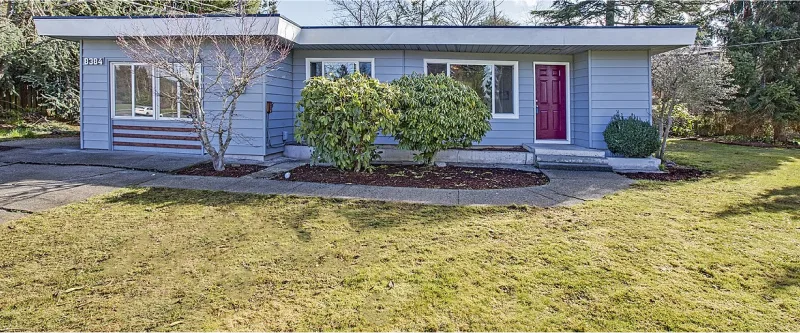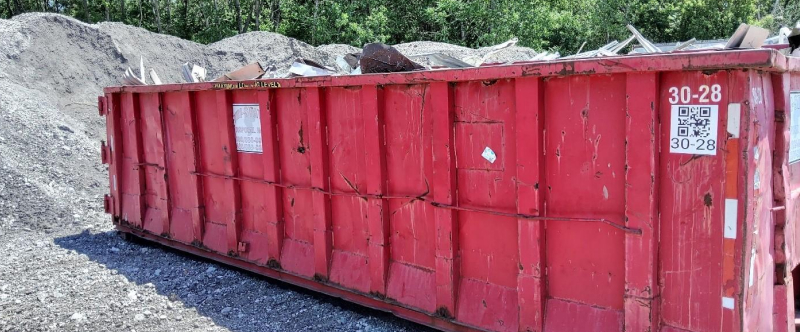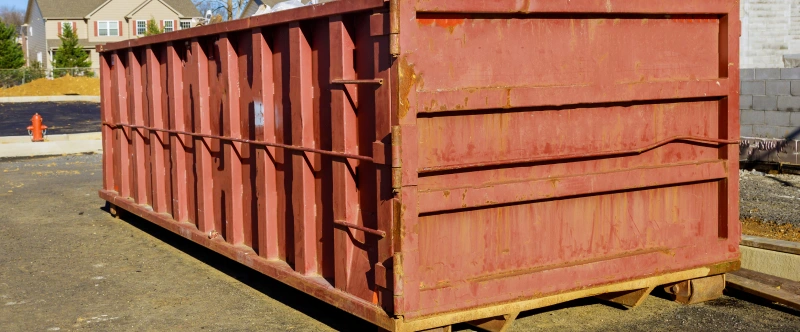When undertaking a landscaping project, spring cleaning, or clearing overgrown trees and shrubs, one of the best solutions for managing large amounts of organic debris is by renting a dumpster.
Yard waste dumpsters are designed specifically to handle organic materials like leaves, grass clippings, tree branches, and other garden waste. However, like all dumpster rentals, the costs can vary based on several factors.
“Pricing yard waste dumpsters is a bit different because the materials—like leaves, branches, and grass—are lighter but bulkier, so it’s more about volume than weight,” says Bryan Goetz, CEO of S&A Container Service. “What really complicates things is how towns handle disposal—some have strict rules about separating yard waste, or they only accept it during certain months. Seasons play a big role too—fall cleanup season, for example, can drive up demand. So we always have to stay on top of local regulations and plan ahead based on the time of year. It’s definitely not a one-size-fits-all situation.”
This article will guide you through the pricing of these types of containers and the different elements that affect your rental costs.
Why Choose a Dumpster for Yard Waste?
A dumpster for yard waste is a specialized bin designed to accommodate materials such as:
- Grass clippings
- Leaves
- Branches
- Soil
- Garden trimmings
- Leftover piles of firewood
These types of dumpsters are ideal for residential and landscaping projects where the goal is to clear organic waste from the yard. Because these materials are typically lighter than construction debris, the cost for yard waste containers is generally lower. However, several factors will determine the overall price you’ll pay, such as dumpster size, location, and rental duration.
Typical Costs of Renting a Yard Waste Dumpster
The cost of renting a dumpster specifically for yard waste will depend largely on the size of the container, location, and how long you need it. Here’s a general guide to what you can expect:
- 10-yard container: $450–$500
- 20-yard container: $650–$750
- 30-yard container: $750–$850
Smaller containers like the 10-yard are often used for basic cleanups, while the larger 30-yard dumpsters are more suited for bigger landscaping projects or tree removals. Generally, containers for yard waste are priced lower than general waste containers because of the lighter, less hazardous nature of organic debris.
However, tree trunk and stump removal is typically priced at a flat rate or per yard due to their weight and density, which differ significantly from lighter yard debris. Be sure to speak with our dumpster rental team before loading these heavy items, as they require special pricing and handling compared to standard yard waste.
Factors That Influence the Price of Yard Waste Dumpster Rentals
Several factors can affect the cost of renting a dumpster. Here are the primary variables to consider:
Size of the Dumpster
Smaller containers (10–15 yards) are suitable for lighter, smaller projects like lawn mowing or shrub trimming. Larger containers (20–30 yards) are designed for larger-scale cleanups, such as tree removal or extensive overhauls. The bigger the dumpster, the higher the price.
Location
The area where you live can have a significant impact on rental fees. Long Island dumpster rental companies adjust their pricing based on local disposal regulations and disposal site costs.
Rental Duration
Standard rentals usually last between 7 to 14 days, but you may incur additional daily charges if the rental period extends beyond this. These charges typically range from $10–$25 per extra day. Therefore, completing your garden area cleanup within the standard rental period can help avoid unexpected charges.
At S&A Container, we rarely charge for added days to your rental.
Weight Limits and Overweight Charges
Each dumpster comes with a weight limit, and if you exceed that limit, additional charges may apply. Yard waste, while typically lighter, can still accumulate significant weight, especially when handling heavy tree branches or large amounts of soil. If the dumpster exceeds its weight capacity, you could incur additional charges of $100–$200 per ton over the limit.
Disposal Fees
Some rental companies may charge extra fees based on the type of waste you’re disposing of. If you mix non-organic materials like plastics or metals with organic waste, you may incur sorting or disposal fees. Make sure to check with the rental company to confirm which materials are acceptable to avoid these extra charges.
Related articles about rental fees and prices:
- Mini dumpster rental uses and prices
- Cost to rent a residential dumpster in Long Island
- Roll-off dumpster rental costs in Long Island
Ways to Save on Yard Waste Dumpster Rentals
While renting a dumpster can be a convenient way to clean up your property, there are several strategies to help reduce them.
Select the Appropriate Size Dumpster
Renting the correct size is crucial to avoid paying for space you don’t need or overloading a small container. Take the time to estimate the amount of debris you’ll be removing and choose the dumpster size accordingly. Rental companies can provide guidance if you’re unsure of what size to pick.
Avoid Extra Rental Days
To save on rental costs, try to finish your landscape cleanup within the standard rental period. Extending the rental period could incur daily charges that add up quickly. If you’re done early, be sure to return the dumpster promptly to avoid unnecessary fees.
Be Mindful of Weight Limits
Exceeding the weight limit for your dumpster is one of the quickest ways to rack up additional charges. Try to load the container carefully, ensuring that you don’t place excessive heavy items, like large tree trunks or dense soil. Always double-check with the rental company about the weight limits and avoid overfilling the dumpster.
Place the Dumpster on Private Property
Whenever possible, place your dumpster on private property, such as your driveway or yard. If the container needs to be placed on public property, such as the street, you may need to obtain a permit, which could increase your final bill. Check with local authorities to understand the permit requirements and costs.
Common Uses for Yard Waste Containers
A yard waste dumpster is helpful for various residential and landscaping projects, including:
-
Spring and Fall Cleanups: These seasons often bring significant amounts of leaves, twigs, and garden debris.
-
Tree and Shrub Removals: Tree cutting or trimming projects can generate substantial yard waste, especially if you’re dealing with large branches or entire trees. A dumpster can streamline the cleanup process.
-
Landscape Renovations: When overhauling a garden, preparing for new plantings, or replacing sod, a dumpster is an excellent solution for managing organic waste.
-
General Yard Maintenance: Regular lawn mowing, weeding, or clearing out dead plants and shrubs generates natural waste that can be easily disposed of in a container designed for yard debris.
- Property Cleanup: Renting a dumpster is the perfect solution for cleaning up your home’s property when it’s cluttered with debris left behind by a previous owner. It makes the process faster, easier, and more efficient so that you can start fresh with a clean space.
Conclusion
Choosing a dumpster is an efficient way to clear your yard and keep your property looking pristine. The cost of renting a dumpster for this purpose can vary depending on several factors, including the size of the container, location, and rental duration. By understanding these factors and using strategies to minimize costs, you can ensure that your yard cleanup remains within budget.
Always consult with your rental company for assistance in selecting the right size and make sure you understand any additional fees that may apply.
By taking the time to plan ahead, you can get the most out of your yard waste dumpster rental and avoid unnecessary expenses.


